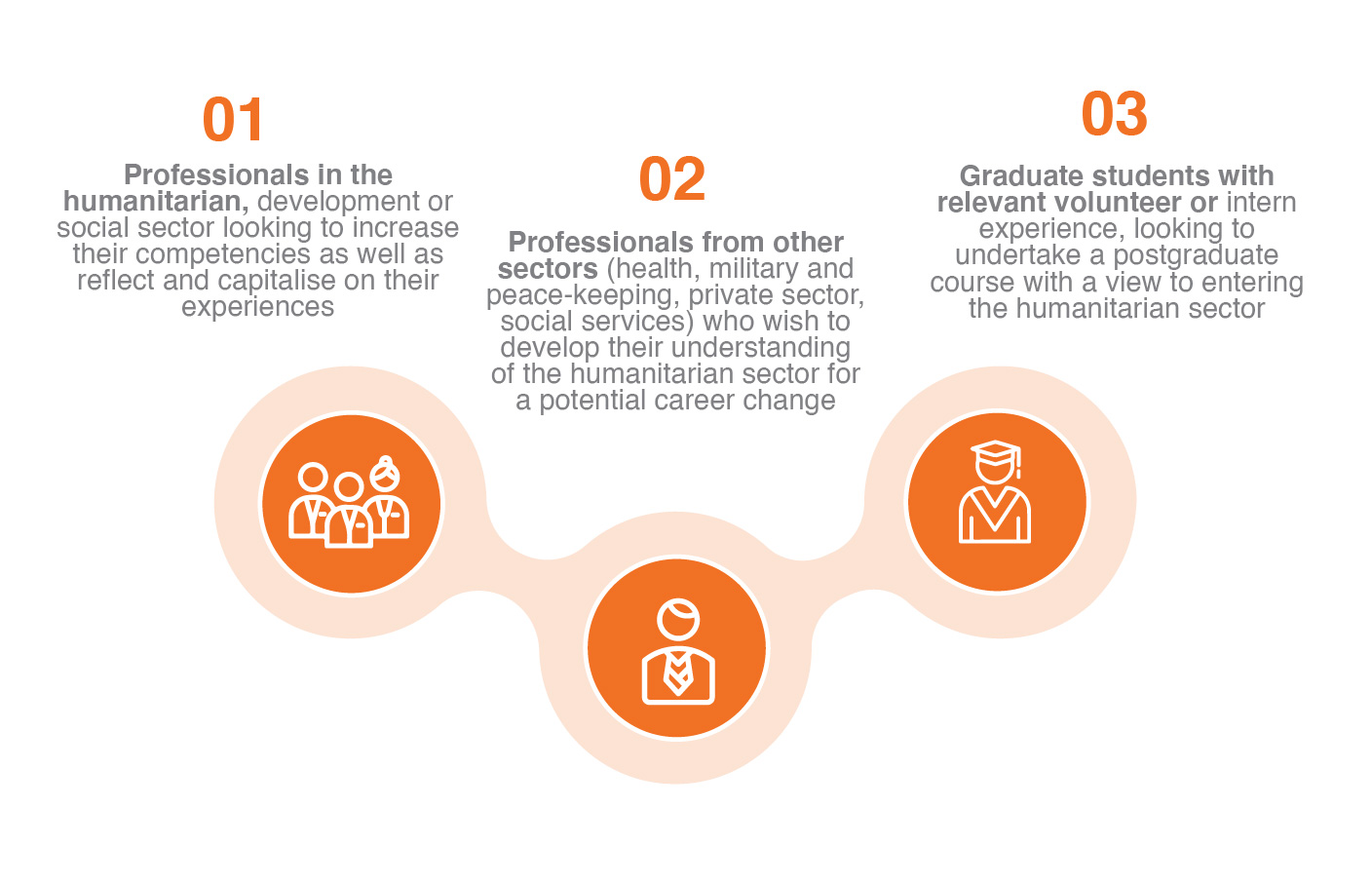Diploma of Advanced Studies in Humanitarian Action
The Diploma of Advanced Studies (DAS) aims to offer professionals a critical understanding of the humanitarian system and an ability to contextualize humanitarian action in today’s world. Taking an interdisciplinary approach, it explores the historical, political, social, cultural and economic roots of humanitarianism and the power dynamics at play in relationships between States, non-State actors, international organisations, international and local non-governmental organizations and affected populations. Finally, the programme addresses the colonial legacy of past and present humanitarian interventions to identify new avenues for contemporary and future crises.
The Diploma is a 100% residential programme in Geneva. The DAS programme is intensive, with at least four days per week in class. Participants should invest full time in classes, self-learning activities, assignments and a dissertation, and networking in Geneva.
- Application Deadline Excl. EU/EFTA citizens: 31 May / Only EU/EFTA citizens: 30 June
-
New dates for 2026 are TBC
- 14.5 weeks
- Geneva
- English
- 30 ECTS
-
CHF 8,000
- If applying for a scholarship Deadline: There are no scholarships available for this programme.

Module 1: Humanitarianisms: Historical, moral and political foundations of aid
This module traces the genealogy of humanitarianism and its social and political foundations, as well as the moral sentiments that gave birth to humanitarian feelings since the 19th century. By placing the evolution of different categories of actors, whether it is the Red Cross movement, international non-governmental organisations, the United Nations, or local communities, in a global perspective, the module situates different forms of humanitarianisms. This allows to compare secular humanitarianism with other forms of international solidarity, such as grassroots movements, charity, and faith-based organisations, as well as to question the role of the States and the instrumentalisation of the humanitarian ethos in geopolitics.
Module 2: Legal and policy frameworks relevant to humanitarian action
This module discusses several of the core legal and policy frameworks relevant to humanitarian action using insights from various disciplines within the field of humanitarian studies as well as perspectives from practitioners involved in protection and advocacy work. It introduces students to key texts that introduce basic principles of international law including: international human rights, international humanitarian law (IHL), refugee and migration law and international criminal law. There is an applied element to the Module in that participants will have the opportunity to engage in observational visits to UN human rights treaty monitoring bodies and to the Human Rights Council. The course also covers the regulatory landscape applicable to situations of transitional justice, the responsibility to protect (R2P) and the humanitarian impacts of sanctions regimes.
Module 3: Transforming the humanitarian system through localisation
This module explores the changing nature of humanitarian crises and highlights the new challenges brought by the impact of climate change, rapid urbanisation, resource scarcity, mass displacement and pandemics on large populations. To face these changes, there has been strong emphasis on valuing the role of local and national actors in the coordination, efficiency and accountability of humanitarian assistance. The module discusses the realities, ambiguities and debates about localisation and the power shift needed in the humanitarian system. It places particular emphasis on the conditions needed to construct people-centred approaches using examples from humanitarian economics, refugee health and disaster risk reduction.
Module 4: Humanitarian projection: Sectoral responses to crisis
This module examines the humanitarian project, at once representing the specific operational programming of the sector, its principles, strategic policies and aspirations, as well as its perceptions of people crisis and their needs. The module will use the HDP Nexus to focus the discussion on humanitarian praxis: how humanitarians relate to and interpret context, needs and vulnerability, protection, principles, and their responsibilities to “neighboring” sectors such as development, peace, climate and governance. For each topic, definition and theory will be joined with an emphasis on the applied element, capitalising upon the work of the participants.
Module 5: The Humanitarians: relationships and interactions in the aid system
The humanitarian system, or Aidland – as it is named by anthropologists who observe it – is a complex and interconnected world that is shaped by sociopolitical, organisational and cultural dynamics. Understanding Aidland requires a recognition of these multifaceted elements and the way they interact to shape the global aid landscape. This module provides anthropological and sociological lenses to explore the humanitarian system, including its values, codes of conduct, behaviours and relations of power. It examines the everyday lives and motivations of humanitarian workers, be they expatriates or local staff, as well as the unequal interactions between humanitarian organisations, humanitarian workers, affected populations and donors.
DAS dissertation
Throughout the DAS, participants will engage in a series of workshops designed to develop information-gathering and processing, ethnographic observation and visual analysis. These workshops will help participants write two assignments (film review and conference report) that constitute the core of the dissertation. The overall aim of the DAS dissertation is to stimulate a critical and original reflection on issues linked to humanitarian action through specific writing exercises.
The submission deadline for the DAS dissertation is January 31, 2026.
For detailed information about admission criteria, required documents, deadlines, and the application process for the Master, please refer to the “How to Apply” page on our website.


Designation: Senior Lecturer and Researcher, Head of Learning